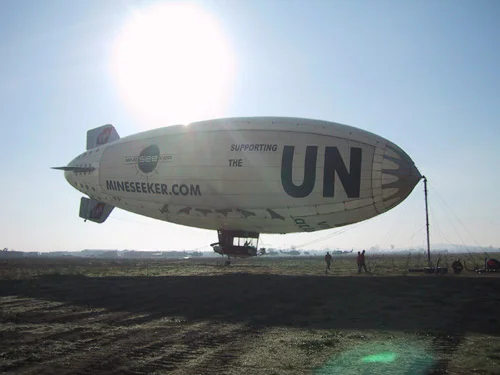Vision Land-Mine removal from $1000 a mine to $8?
After Princess Diana passed tragically in 1997, a group of Influencers came together to help carry on her humanitarian legacy work by changing the cost of land mine removal work and rid the world of land mines. This was before streaming and drones! so it required blimps and ground penetrating radar systems.
The Founding vision of Mike Kendrick was embraced by patrons of Mineseeker were Nelson Mandela, his wife Grace Rachel, Queen Noor, Sir Richard Branson, John Paul de Joria and Brad Pitt. Executive Director was Charlie Stuart Gay. Going to Mozambique and Africa changed their lives for ever. in ways they did not anticipate.
An article By Melonie Magruder / Special to The Malibu Times February 2007
Mozambique is a country in southeast Africa a little larger than Texas whose economy has been ravaged by years of AIDS and civil war. It has a population of about 19 million, who mostly survive on small-scale farming, but almost 90 percent of Mozambique's arable land is still uncultivated. That is because Mozambique also has about one million unexploded landmines scattered silently and lethally around the country.
Landmines are the deadly remnants of civil war and it is estimated that there are more than 100 million lying just beneath the surface of our planet worldwide. They are not designed to kill, necessarily, but to blow off the legs of its victims, and Mozambique's population is rife with scarred and twisted stumps.
In many African countries, landmines have a devastating domino effect on their struggling economies. Victims of landmines are rendered incapable of self-support and the terror of unexploded mines renders the rest of the population unwilling to cultivate perfectly farmable land. Economic and social progress is paralyzed.
Into this breach of stagnation has stepped a group of innovative and passionate advocates called the Mineseekers, founded by Michael Kendrick. Their project: The Sole of Africa. Headed by patrons Nelson Mandela and his wife, Graca Machel, Queen Noor of Jordan, British entrepreneur Sir Richard Branson and Malibu residents John Paul DeJoria and Brad Pitt, the Mineseeker Foundation aims to return farmland to the citizens of Mozambique and encourage economic growth and sustainability.
"Landmines kill or maim somebody every 19 minutes," said Charlie Gay, executive director of the Mineseeker Foundation. "These countries are in peril. We want to empower these citizens to reclaim their land without fear and look forward to a future of purpose and dignity."
Until recently, it would cost agencies up to $1,000 to remove or disable a single landmine in a slow, inefficient process that would require 600 years to eliminate them completely from the world. Mineseekers has developed a breakthrough technology that can detect the positions of mines by using ground-penetrating radar, mounted on the stable platform of an airship, in the form of a blimp, which scans the ground at more than 100 yards per second.
"Just as important as finding landmines is finding land where there aren't any mines," Gay said.
DeJoria, founder of the hugely successful John Paul Mitchell Systems hair care products, has plunged wholeheartedly into the rescue of Mozambique with Mineseekers.
"I worked with the Rotary Club of South Africa to go in and fit people there with prostheses," DeJoria said. "Suddenly, people who had been reduced to begging have a future. It's amazing!"
DeJoria is a firm believer that the blessings of his rags-to-riches career obligate him to give generously of his time and resources.
"Success without charity is failure," he said.
"Using the radar-mounted blimp, we can map fields that people won't step foot in for fear of landmines," DeJoria explained. "Not only does this save villages from having to care for another generation of legless and armless people, we've recovered land for them that will provide food and commerce."
With the new technology, DeJoria added, the cost of removing landmines drops down to about three dollars apiece.
Update on the Global Land Mine Issue - 2024
BBC Article: https://www.bbc.com/culture/article/20240112-princess-dianas-1997-landmine-walk-i-come-with-my-heart
A problem remains on an immense scale
The media spotlight, and the public's fascination with Diana sparked a boost in funding for demining projects and galvanised governments to address the crisis, resulting in the creation of the Ottawa Treaty in 1999, which aimed to eliminate the use, production, stockpiling and transfer of anti-personnel landmines.
The princess would not live to witness the fruits of her labour. Just a couple of weeks after her visit to Bosnia, she was killed in a car crash in Paris on 31 August 1997.
Tony Blair, the newly elected UK Prime Minister, pledged to ratify the Ottawa Treaty in time for the anniversary of her death.
But the landmine issue is far from solved, and the scale of the problem is immense. A number of key countries refused to sign the 1999 treaty banning their use, including the US, Russia, China, Israel and Iran, while India, Myanmar, Pakistan and South Korea still manufacture them.
Even in areas where the conflict has long ended, the landmines create a devastating and deadly legacy. From Afghanistan to Croatia, Cambodia to Libya, these weapons lie buried, waiting to be stepped on, continuing to indiscriminately kill and maim people for years afterwards.
Indeed, no one really knows how many landmines there are globally; some date back to World War Two, their locations long since forgotten. According to the International Campaign to Ban Landmines, at least 5,544 people were killed or injured by minesaround the world in 2021. Most of those victims were civilians. Half of them were children.
The Mines Advisory Group (MAG) says that in Angola, where the princess made her iconic walk, an area of 7,300 hectares (the equivalent to more than 10,000 football pitches) still needs to be cleared of mines.
And new mines are being laid in conflict areas all the time. Ukraine's government has said that 724 people have been blown up by mines, with 226 of them being killed, since Russia launched its full-scale invasion on 24 February 2022. There is thought to be a 174,000 sq km area of Ukraine now contaminated by landmines.
However, the campaign Diana championed endures. Her sons, Prince William and Prince Harry, have now taken up the mantle of her advocacy, and organisations such as the Halo Trust, MAG and the International Campaign to Ban Landmines remain committed to global demining efforts, and supporting communities blighted by these hidden, deadly weapons.


